8 Good Foods to Reduce Stomach Ulcers
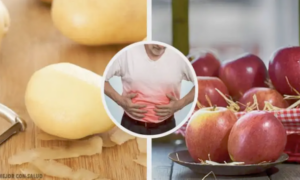

Reviewed and approved by the nutritionist Eliana Delgado Villanueva
You should reduce stomach ulcers as these affect the inner lining of your stomach or small intestine and can impair quality of life.
Most cases are bacterial but there are other influential factors such as bad habits such as the excessive consumption of alcohol and tobacco as well as certain medications, and stress that leads to negative emotions. Check out this article and find out more about what are the 8 best foods for preventing and treating stomach ulcers.
8 foods that help reduce stomach ulcers
1. Pineapple
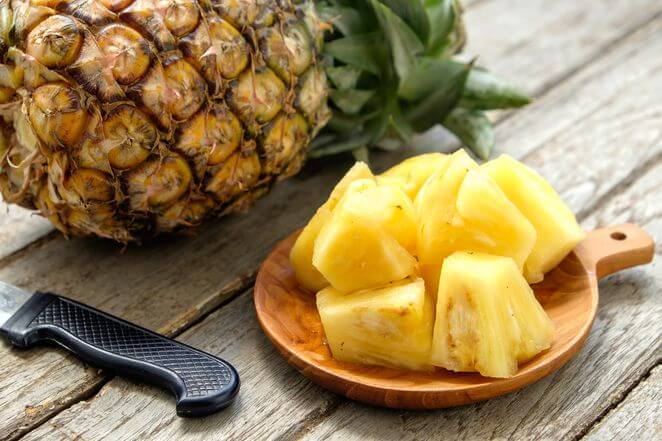
Pineapple is rich in enzymes that aid digestion, especially that of foods that have a high protein content.
In addition, it stands out for its anti-inflammatory properties due to bromelain, according to this study conducted by Mangalayatan University in India.
You can eat fresh pineapple before meals or as a desert. You can also add it to your homemade juices and smoothies.
2. Cabbage
This vegetable has a high alkalizing ability so it promotes healing of stomach ulcers.
You can eat them raw by leaving them to marinate in oil, vinegar, and salt for a few hours. You can also cook it or add it to your beverages.
Eat it in moderation if you have hypothyroidism.
3. Red peppers
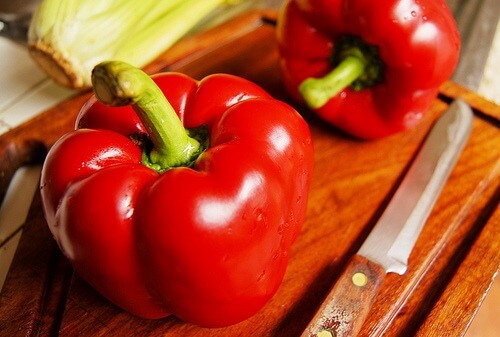
Red bell pepper is a highly appetizing and gastric tonic — it whets the appetite and stimulates the secretion of gastric juices. At least according to this study conducted by the Central Food Technological Research Institute in India.
You can eat red pepper raw in juices, salads, or as a garnish. It can also be cooked or grilled. These last two ways of fixing this vegetable give it a great flavor. It also goes well with any dish.
Read about The Nutritional Value of Red Fruit and Vegetables
4. Raw potato juice can help reduce stomach ulcers
These are great antacids. Not only are they still appetizing in spite of your heartburn but raw potatoes are juice is also an ancient anti-inflammatory remedy, as this research from Purdue University in the US affirms.
If you want to make this ancient remedy, you need to drink the following for breakfast over the course of nine days.
Ingredients
- ½ c. of raw potato juice. This juice should come from a potato that’s been well washed, peeled, and that doesn’t have any sprouts. (100 ml.)
- 1 tbsp. of extra virgin olive oil (16 g.)
You should drink this 30 minutes before breakfast, at least.
5. Carrots
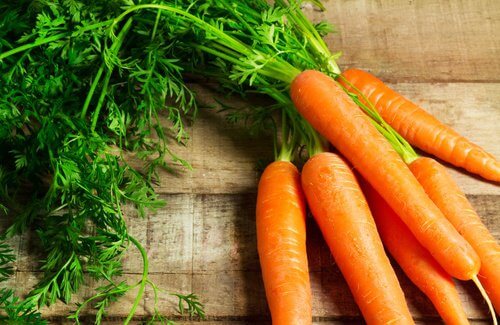
A homemade carrot apple juice is a great combination you can drink half an hour before meals as a preventative measure for heartburn.
6. Apples can help reduce stomach ulcers
Apples are one of the most common fruits and also one of the richest when it comes to health properties.
This fruit is a natural digestive regulator and thus, perfect for managing problems like ulcers, gastritis, heartburn, pain, constipation, and diarrhea. At least according to as explained in this study from the University of Reading in the UK.
Apples are great for preventing and healing gastric ulcers thanks to their content of fiber, beta-carotene, and vitamin C. These nutrients promote the healing of the tissues in your digestive system.
Check out these 5 Benefits of Eating Apples
7. Aloe vera
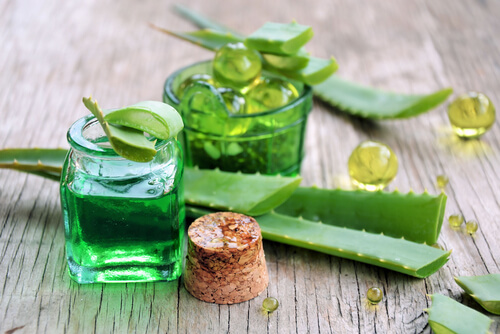
Aloe vera is a plant that stands out due to its fantastic healing ability. Also, it’s an antioxidant, antibacterial, and anti-inflammatory remedy, according to this study by the College and Research Institute in India. Aloe vera is an effective treatment for stomach ulcers for various reasons:
- Its antibacterial properties prevent Helicobacter Pylori from reproducing. This bacterium is often related to issues with ulcers.
- Ulcers are also related to the inflammation of your whole digestive tract, and aloe has an anti-inflammatory property.
- Among its anthraquinone compounds, it has some that make it a great help for the lining of your digestive system.
8. Saltwater
Today you can find saltwater that’s ready to drink in some supermarkets and health food stores. This is because people have discovered that it’s a great source of minerals and trace minerals.
Other ways to reduce stomach ulcers
To fight gastric ulcers, you can also follow the following advice:
- Eat simple meals without mixing several kinds of foods at once.
- Chew well and don’t eat in a rush.
- Don’t drink water while you eat but before breakfast, at midday, and mid evening.
- Avoid consumption of tobacco and alcohol.
- Fight stress with natural remedies and relaxation therapies. These can be massages, yoga, tai chi, etc.
- Avoid fried and processed foods, white sugar, and spicy or stimulating substances. These include coffee, soda, peppers, cinnamon, cloves, ginger, etc.
In conclusion
Notwithstanding the useful tips to improve this pathological condition above, it’s always best to consult a doctor as they’re qualified to diagnose and prescribe treatment for stomach ulcers.
However, you can always adopt a diet that benefits the recovery process as a complement to medical treatment. A diet that contains the foods listed in this article.
All cited sources were thoroughly reviewed by our team to ensure their quality, reliability, currency, and validity. The bibliography of this article was considered reliable and of academic or scientific accuracy.
- Aditi A, Graham D. Vitamina C, gastritis and gastric disease: a historical review and update. Digestive Disease Science. Diciembre 2013.
- American College of Gastroenterology. Peptic Ulcer Disease. Abril 2021.
- Asdaq S. M, Swathi E, et al. Role of Daucus carota in enhancing anti ulcer profile of pantoprazole in experimental animals. Molecules. Noviembre 2020. 25 (22): 5287.
- Caballé, F. F. (2008). Epidemiología, factores pronósticos y causas de hemorragia digestiva alta no varicosa. Gastroenterologia y Hepatologia Continuada.
- Canadian Society of Intestinal Research. Stomach Ulcer Diet.
- Cheney G. Rapid healing of peptic ulcers in patients receiving fresh cabbage juice. Western Journal of Medicine. Enero 1949. 70 (1): 10-15.
- Guimarães, L. L., Ventura, A. L., Capellari, L. R., Souza, V. V. de, & Toma, W. (2017). Análise fitoquímica de plantas medicinais indicadas popularmente na forma de garrafadas para o tratamento da úlcera gástrica. Unisanta Health Science.
- Jain S, Rathod N, et al. Antibacterial effect of Aloe Vera gel against oral pathogens: an in-vitro study. Journal of Clinical & Diagnostic Research. Noviembre 2016. 10 (11): ZC41-ZC44.
- Kong F, Singh R. P. Solid loss of carrots during simulated gastric digestion. Food Biophysics. 2011. 6 (1): 84-93.
- Koutsos A, Tuohy K. M, Lovegrove J. A. Apples and cardiovascular health – is the gut microbiota a core consideration? Nutrients. Junio 2015. 7 (6): 3959-3998.
- Lucas L, Russel A, et al. Molecular mechanisms of inflammation. Anti-inflammatory benefits of virgin olive oil ad the phenolic compound oleocanthal. Current Pharmaceutical Design. 2011. 17 (8): 754-68.
- Marotta R. B, Floch M. H. Diet and nutrition in ulcer disease. The Medical Clinics of North America. Julio 1991. 75 (4): 967-979.
- Pavan R, Jain S, et al. Properties and therapeutics application of bromelain: a review. Biotechnological Research International. Diciembre 2012. 976203.
- Ramírez A, Pacheco de Delahaye E. Propiedades funcionales de harinas altas en fibra dietética obtenidas de piña, guayaba y guanábana. Interciencia. Abril 2009.
- Reddivari L, Wang T, et al. Potato: an anti-inflamatory food. American Journal of Potato Research. Diciembre 2018. 96 (2).
- Ruggiero P. Use of probiotics in the fight against Helicobacter pylori. World Journal of Gastrointestinal Pathophysiology. Noviembre 2014. 5 (4): 384-391.
- Srinivasan K. Biological activities of pepper alkaloids. Natural Products. Mayo 2013. 1397-1437.
- Valdivia Roldán, Mario. “Gastritis y gastropatías.” Revista de Gastroenterología del Perú 31.1 (2011): 38-48.
This text is provided for informational purposes only and does not replace consultation with a professional. If in doubt, consult your specialist.








